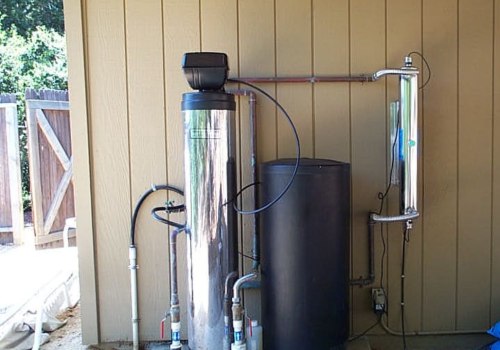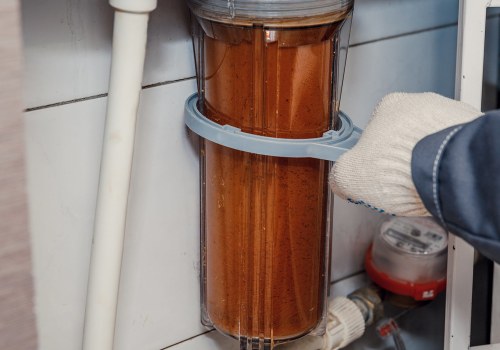Liquid Lifelines: Safeguarding Your Health with Effective Water Filtration Systems
Did you know that the average American consumes over 7 billion gallons of bottled water yearly? That's a staggering amount, especially considering that water filters can offer an affordable and eco-friendly alternative.
This article will explore how water filters protect your health by removing harmful substances. From understanding water contaminants to choosing the right filter for your needs, we'll dive into the importance of filtration and how it improves taste, odor, and protection against bacteria and viruses.
Get ready to save money in the long run while safeguarding your well-being.
Key Takeaways
• Regularly checking and replacing water filters is crucial for effectively removing harmful substances and ensuring clean drinking water.
• Following the manufacturer's recommended replacement intervals and maintenance schedule is essential for optimal performance of water filtration systems.
• Proper water filter maintenance helps protect health by ensuring optimal functioning and preventing water contamination.
• Consuming unfiltered water can pose various health risks, including gastrointestinal issues, potential exposure to toxins, and a compromised immune system.
Understanding Water Contaminants
Understanding water contaminants is essential for maintaining your health and well-being. Water quality standards, guidelines set by regulatory agencies, define the acceptable levels of various pollutants in drinking water. These standards are based on extensive research and scientific evidence to ensure that the water you consume is safe.
Several contaminants can be found in water, including bacteria, viruses, chemicals, heavy metals, and pesticides. These contaminants can have adverse health effects if consumed in high concentrations or over a long period. For example, bacteria such as E. coli can cause gastrointestinal illnesses, while lead exposure can lead to developmental issues in children.
The Importance of Water Filtration
Water filters are a reliable and effective solution when removing harmful substances from your drinking water. Using various filtration methods such as activated carbon or reverse osmosis, water filters can remove contaminants like chlorine, lead, and bacteria, ensuring your water is safe and clean.
Not only do water filters provide health benefits by purifying your drinking water, but they also offer convenience and cost savings compared to buying bottled water regularly.
How water filters remove harmful substances
Water filters remove harmful substances by trapping them in a porous material. This is important because unfiltered water can negatively impact your health. Drinking contaminated water can lead to various health risks, including:
1. Bacterial infections: Unfiltered water may contain bacteria like E. coli and Salmonella, which can cause severe gastrointestinal illnesses.
2. Chemical exposure: Contaminated water can contain harmful chemicals such as lead, arsenic, and pesticides. These substances can harm your nervous system, kidneys, and overall well-being.
3. Parasitic infestations: Without filtration, water sources may be contaminated with parasites like giardia and cryptosporidium. These parasites can cause diarrhea, abdominal pain, and other digestive issues.
Benefits of using a water filter in your home
Using a water filter in your home can improve the taste and quality of your drinking water. Water filters are designed to remove impurities such as chlorine, lead, bacteria, and other harmful substances that may be present in tap water. By removing these contaminants, water filters enhance the flavor of your drinking water and safeguard your health.
Improving water quality is essential for maintaining good health. Drinking clean and filtered water can reduce the risk of gastrointestinal diseases caused by bacteria or parasites in untreated water sources. Additionally, filtering out heavy metals like lead helps protect against potential neurological damage, particularly in children.
Water filters also provide health benefits by reducing exposure to potentially harmful chemicals in tap water. Some studies have linked long-term consumption of specific contaminants, such as pesticides and industrial pollutants, to an increased risk of cancer and other chronic illnesses.
Choosing the Right Water Filter
To ensure your health is protected, selecting the right water filter for your specific needs is essential. With so many water filter options available, it can be overwhelming to determine which one is best for you.
When comparing water filtration systems, there are a few key factors to consider.
Firstly, look at the contaminants the filter can remove. Different filters target substances like chlorine, lead, or bacteria.
Secondly, consider the filtration method used by the system. Some filters use activated carbon to absorb impurities, while others rely on reverse osmosis or UV light sterilization.
Lastly, think about maintenance and cost. Filters require regular replacement and may vary in price depending on the type and brand.
Improving Water Taste and Odor
One way to enhance the taste and smell of your water is by using activated carbon filters. These filters effectively remove impurities from your water, resulting in a cleaner and fresher taste. Here are three reasons why started carbon filters can significantly improve your drinking experience:
1. Removal of chlorine: Activated carbon can effectively remove chlorine and its byproducts from water, giving off a strong odor and affecting the taste.
2. Reduction of contaminants: Activated carbon filters can also trap and remove common contaminants such as lead, pesticides, and volatile organic compounds (VOCs), ensuring safer and healthier drinking water.
3. Environmental sustainability: Using activated carbon filters benefits your health and helps reduce plastic waste caused by bottled water consumption. By opting for filtered tap water instead, you contribute to a more sustainable environment.
Protecting Against Bacteria and Viruses
Activated carbon filters are highly effective in reducing the presence of bacteria and viruses, ensuring that your drinking water is safe and free from harmful microorganisms. These filters are designed to remove impurities from water through adsorption.
The porous structure of activated carbon captures and traps bacteria, preventing them from passing through into your drinking water. The filters can also trap viruses, providing an added layer of protection against these microscopic organisms.
Numerous studies have shown the effectiveness of activated carbon filters in removing bacteria such as E.coli and Salmonella, as well as viruses like Hepatitis A and Norovirus. By using a water filter with proper bacteria filtration and virus protection capabilities, you can have peace of mind knowing that your drinking water is clean and safe for consumption.
Long-Term Cost Savings
Now that you understand how water filters protect you from harmful bacteria and viruses let's discuss the long-term cost savings they can offer.
Investing in a water filter may seem like an additional expense, but it can save you money in the long run. An expert cost analysis has shown that using a water filter can significantly reduce your spending on bottled water over time.
By filtering your tap water instead of buying single-use plastic bottles, you save money and contribute to reducing plastic waste and its environmental impact.
Additionally, some advanced filtration systems have features like filter replacement indicators that help you track when to change the filters, ensuring optimal performance and maximizing your cost savings.
Maintenance and Replacement
Investing in a water filter means you'll need to change the filters to ensure optimal performance regularly. To maintain the effectiveness of your water filter, follow a maintenance schedule and replace the filters as recommended by the manufacturer.
The lifespan of a water filter can vary depending on several factors, such as usage, water quality, and filter type. Typically, carbon filters have an average lifespan of 2-6 months, while reverse osmosis membranes can last anywhere from 1-3 years.
You must check your filter's lifespan and adhere to the recommended replacement intervals to ensure harmful substances are effectively removed from your drinking water. By following a proper maintenance schedule and replacing filters on time, you can ensure that your water filtration system functions optimally and continues to protect your health.
Frequently Asked Questions
How do water filters remove harmful substances from the water?
Water filters remove harmful substances from water through various mechanisms. They can use activated carbon to absorb contaminants or a semi-permeable membrane to block particles physically. Using water filters provides numerous benefits for your health.
Can water filters remove all types of contaminants?
Can water filters remove all types of contaminants? While water filters effectively eliminate many harmful substances, they have limitations. They can remove common contaminants like chlorine and lead but may not be able to eliminate certain chemicals or viruses.
Are there any health risks associated with using water filters?
Potential health risks are associated with using water filters, but overall they effectively remove harmful substances. It is essential to choose a certified and regularly maintained filter for optimal performance.
How often should I replace the filter in my water filter system?
Regular filter maintenance is crucial to ensure your water filter system functions effectively. While the lifespan of filters varies, experts generally recommend replacing them every 2-6 months to maintain optimal filtration and protect your health.
Do water filters affect the pH level of the water?
Water filters can affect the pH level of water, which in turn may affect its taste. Some filters use materials that can increase or decrease pH levels. Additionally, specific filter cartridges have an environmental impact due to their disposal methods.
Earthwise Water Filters Phoenix
922 N Colorado Street, Gilbert AZ 85233
(602) 878-6160








